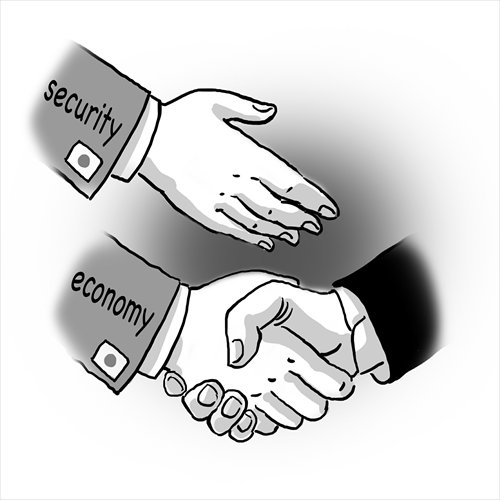Modi knows China relations more important in long run

Illustration: Liu Rui/GT
Indian Prime Minister Narendra Modi is currently on a state tour to Japan. Just prior to the visit, Modi decided to extend his stay in Japan by one day. The extension was interpreted by some Indian media outlets as "a bold signal to China."
The exact intentions of Modi's move are unknown. But against the backdrop of the US "pivot" to the Asia-Pacific region, a strained China-Japan relationship, and the simmering South China Sea disputes, Modi's visit to Japan creates another opportunity for some Indian media outlets to hype the tensions in Sino-Indian relations.
The prolonged visit reflects the importance that the Modi government attaches to Japan. By extending the tour, Modi is also making up for his repeated decisions to postpone the trip.
Japanese Prime Minister Shinzo Abe invited Modi to visit Japan as early as their phone conversation to congratulate Modi's victory in the general elections. It was once assumed by both Japanese and Indian media that Modi would choose Japan as the destination of his maiden overseas tour, right before Modi's meeting with Chinese President Xi Jinping. That was exactly what Abe wanted.
But to Japan's disappointment, Modi took Bhutan as his first stop abroad. Also, New Delhi repeatedly delayed the Japan tour in view of the BRICS summit and the rollout of domestic budget.
The adjustment indicates India's vision of the balance of power as well as its subtle design of big power diplomacy.
The Modi administration apparently views Sino-Indian relations as more important than Indian-Japanese relations. In light of frosty Sino-Japanese ties, if Modi went to Tokyo on his first overseas trip, that would jeopardize India's relations with China.
Besides, Modi snubbed Japan's right before the BRICS summit, demonstrating that the Modi government actually gives priority to China in its foreign policy.
Modi is called by some "India's Abe." Abe hopes to form a value alliance with India and include India in the "democratic security diamond" he advocates.
Although Abe has a private relationship with Modi and both countries have a democratic system, Modi is a shrewd businessman and politician. He knows well what he wants and how to secure India's biggest interest.
Modi's biggest challenge is to kickstart a lagging economy. India needs Japan's investment and technology, but it also needs economic cooperation with China. India is afraid of China's rapid rise, but it doesn't want to harness itself to the war wagon of the US and Japan.
Maintaining strategic independence is India's diplomatic tradition. It's also in the Indian interest to be a balancer in the international system.
It's noticeable that there is a mismatch of supply and demand between India and Japan. India longs for Japan's capital and technology. It expects more Japanese investment in constructing the New Delhi-Mumbai and Chennai-Bangalore economic corridors as well as the infrastructure in northeastern India.
But the India-Japan civilian nuclear deal, which India wants most, may not be sealed during Modi's trip given large divergences between the two.
Japan intends to enhance security and strategic cooperation with India, especially to have India participate in the "democratic security diamond" to contain China. But this is not in the interests of India.
In view of a strained China-Japan relationship and the complexity of the China-India relationship, the Chinese media are full of suspicion when observing Modi's Japan visit. But we should have confidence in China's strategy of peaceful development and China's own national strength.
Boosting the economy is Modi's top priority, and India needs a peaceful neighborhood to fulfill its economic task. Chinese President Xi Jinping will visit New Delhi soon, with the aim of enhancing economic cooperation. At such a crucial moment, if Modi signs agreements with Abe to jointly contain China, then how can he receive Xi later this month?
The author is a research fellow of Shanghai Institutes for International Studies. opinion@globaltimes.com.cn